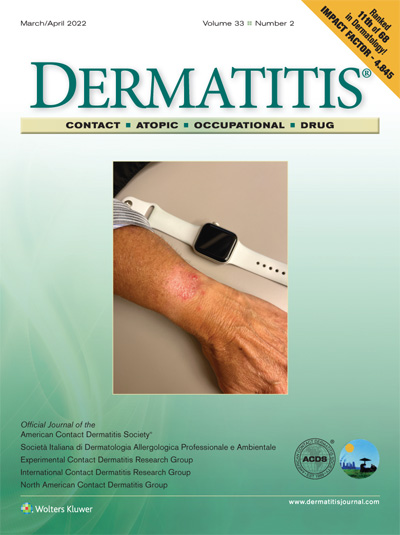评估使用杜匹单抗进行生物治疗前后不同特应性皮炎患者皮肤科生活质量指数评分的临床意义
IF 3.2
3区 医学
Q1 DERMATOLOGY
引用次数: 0
摘要
背景和目的:特应性皮炎(AD)是最常见的炎症性皮肤病,严重影响患者的生活质量。本研究旨在评估接受杜比鲁单抗生物治疗的不同表型特应性皮炎患者的 DLQI 评分的临床意义。研究方法我们对209名接受杜比鲁单抗治疗2年的AD患者进行了回顾性分析。这些患者被分为不同的临床表型。在基线期以及随后的4、12和24个月中,使用湿疹面积和严重程度指数(EASI)、睡眠(NRS sleep)、瘙痒(NRS pruritus)的数字量表评分(NRS)和皮肤科生活质量指数(DLQI)评估疾病的严重程度。结果显示我们的研究结果表明,T0时较高的DLQI评分(平均:18.6,范围:9-30)与结节性瘙痒症AD模式有关,而在使用杜匹单抗治疗24个月后(T3),屈曲型和头颈部综合临床表型的生活质量指数结果最差。结论作为AD的总体终点,生活质量可能是最重要的。在考虑患者管理的决策因素时,评估不同AD表型的DLQI评分的临床意义可能会起到进一步的辅助作用。本文章由计算机程序翻译,如有差异,请以英文原文为准。
Evaluating the Clinical Meaning of Dermatology Life Quality Index Scores Between Different Phenotypes of Atopic Dermatitis in Patients Before and After Biologic Therapy With Dupilumab.
Background and Objective: Atopic Dermatitis (AD) is the most prevalent inflammatory skin disorder resulting in an intense impact on patients quality of life. The aim of this study is to evaluate the clinical meaning of the DLQI scores documented between different phenotypes of AD patients under biologic therapy with Dupilumab. Method: We conducted a retrospective analysis of 209 patients with AD treated with Dupilumab for 2 years. These patients were categorized into different clinical phenotypes. Severity of the disease was assessed by using the Eczema Area and Severity Index (EASI), Numerical Scale Rating (NRS) for sleep (NRS sleep), pruritus (NRS pruritus) and Dermatology Life Quality Index (DLQI) at baseline and subsequently at 4,12 and 24 months. Results: Our results show that the higher DLQI scores (mean: 18.6, range:9-30) achieved at T0 are associated with a prurigo nodularis AD pattern, while after 24 months (T3) of therapy with Dupilumab, the worst quality of life index results were reported in Flexural and Head-Neck combined clinical phenotypes. Conclusions: Quality of life is probably what matters most as an overall endpoint in AD. Assessing the clinical meaning of DLQI scores across different AD phenotypes could be a further aid when considering decision making factors in patient management.
求助全文
通过发布文献求助,成功后即可免费获取论文全文。
去求助
来源期刊

Dermatitis
医学-皮肤病学
CiteScore
5.30
自引率
11.50%
发文量
251
审稿时长
>12 weeks
期刊介绍:
Dermatitis is owned by the American Contact Dermatitis Society and is the home journal of 4 other organizations, namely Societa Italiana di Dermatologica Allergologica Professionale e Ambientale, Experimental Contact Dermatitis Research Group, International Contact Dermatitis Research Group, and North American Contact Dermatitis Group.
Dermatitis focuses on contact, atopic, occupational, and drug dermatitis, and welcomes manuscript submissions in these fields, with emphasis on reviews, studies, reports, and letters. Annual sections include Contact Allergen of the Year and Contact Allergen Alternatives, for which papers are chosen or invited by the respective section editor. Other sections unique to the journal are Pearls & Zebras, Product Allergen Watch, and news, features, or meeting abstracts from participating organizations.
 求助内容:
求助内容: 应助结果提醒方式:
应助结果提醒方式:


